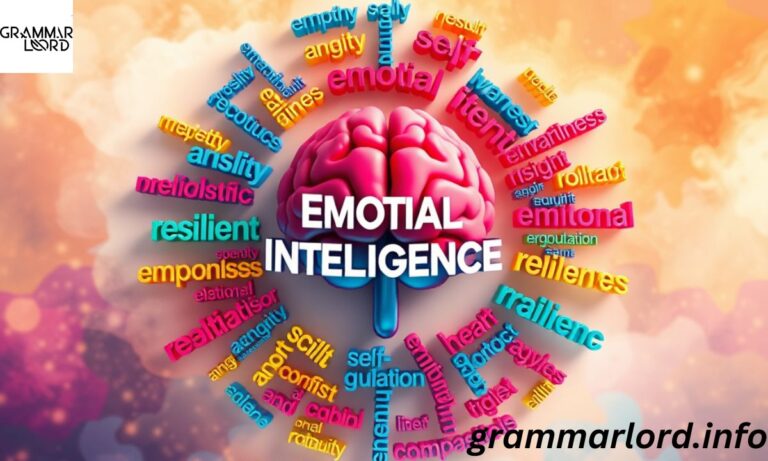Emotional intelligence is the ability to understand and manage emotions in ourselves and others. It includes self-awareness, self-regulation, and emotional resilience, helping us stay in control during challenges.
Skills like empathy, compassion, and active listening strengthen our relationships. Social awareness, relational intelligence, and people skills help us connect with others effectively.
Conflict resolution, adaptability, and mindful communication make interactions smoother. By developing emotional literacy, psychological insight, and behavioral awareness, we grow both personally and professionally.
Main Points
- Emotional intelligence is the ability to understand and manage emotions.
- Synonyms Other terms include emotional awareness, social intelligence, and interpersonal skills.
- Key Traits It involves empathy, self-awareness, emotional wisdom, and emotional insight.
- Importance Helps in communication, decision-making, and managing stress.
- Benefits Leads to better relationships, self-regulation, and professional success.
Social Awareness
Social awareness is the ability to understand and respond to the emotions of others. It involves recognizing social cues and adapting to different situations. People with strong social awareness build better relationships. This skill helps in teamwork and effective communication.
Empathy
Empathy is the ability to feel and understand others’ emotions. It allows people to connect on a deeper level and show genuine concern. Practicing empathy strengthens relationships and trust. It is essential for emotional intelligence and leadership.
Emotional Agility
Emotional agility is the ability to navigate emotions with flexibility. It helps individuals adapt to challenges without being overwhelmed. This skill improves mental well-being and decision-making. Developing emotional agility leads to resilience and growth.
Self-Regulation
Self-regulation is the ability to control emotions and reactions. It helps in managing stress, staying calm, and making rational decisions. People with strong self-regulation avoid impulsive behavior. This skill is crucial for personal and professional success.
Interpersonal Skills
Interpersonal skills involve effective communication and relationship-building. They help in resolving conflicts and working well with others. Strong interpersonal skills improve teamwork and collaboration. They are essential for leadership and social interactions.
Emotional Literacy
Emotional literacy is the ability to recognize and express emotions effectively. It helps people understand their own feelings and those of others. Developing this skill leads to better communication. It is key to managing emotions in a healthy way.
Relational Intelligence

Relational intelligence is the ability to build and maintain strong relationships. It involves understanding social dynamics and emotional needs. This skill enhances trust, teamwork, and cooperation. People with relational intelligence create positive connections.
Compassion
Compassion is the ability to show kindness and understanding toward others. It involves recognizing suffering and offering support. Compassionate people build meaningful and supportive relationships. This skill promotes emotional well-being and social harmony.
Self-Awareness
Self-awareness is understanding one’s emotions, strengths, and weaknesses. It helps people make better decisions and improve personal growth. This skill enhances emotional intelligence and self-control. Developing self-awareness leads to greater confidence and clarity.
Conflict Resolution
Conflict resolution is the ability to handle disagreements effectively. It involves active listening, empathy, and problem-solving. This skill promotes harmony in personal and professional relationships. Strong conflict resolution skills prevent misunderstandings and stress.
Active Listening
Active listening is fully focusing on and understanding what others say. It involves paying attention, asking questions, and giving feedback. This skill strengthens communication and relationships. Practicing active listening fosters trust and respect.
Emotional Resilience
Emotional resilience is the ability to cope with stress and adversity. It helps individuals bounce back from challenges with a positive mindset. This skill promotes mental strength and well-being. Building resilience leads to personal and professional growth.
People Skills
People skills involve effectively interacting and connecting with others. They include communication, empathy, and adaptability. Strong people skills help in teamwork and leadership. They are essential for social and professional success.
Adaptability
Adaptability is the ability to adjust to new situations and challenges. It involves being open to change and learning from experiences. Adaptable individuals stay calm under pressure. This skill is key to personal growth and career success.
Psychological Insight
Psychological insight is the deep understanding of human behavior and emotions. It helps in interpreting actions and motivations. This skill is useful in leadership, counseling, and relationships. Developing psychological insight enhances emotional intelligence.
Social Intelligence
Social intelligence is the ability to navigate social situations effectively. It includes understanding emotions, social cues, and group dynamics. People with high social intelligence build strong networks. This skill improves leadership and teamwork.
Mindful Communication
Mindful communication is speaking and listening with awareness and intention. It involves being present and respectful in conversations. This skill reduces misunderstandings and strengthens relationships. Practicing mindful communication fosters deeper connections.
Self-Management
Self-management is controlling emotions, behavior, and actions effectively. It helps in staying focused, organized, and goal-oriented. This skill improves productivity and emotional balance. Strong self-management leads to long-term success.
Behavioral Awareness
Behavioral awareness is understanding how actions impact others. It involves self-reflection and recognizing behavioral patterns. This skill helps in improving relationships and decision-making. Developing behavioral awareness leads to personal growth.
Emotional Competence

Emotional competence is managing emotions in a healthy and constructive way. It includes self-awareness, empathy, and resilience. People with emotional competence handle stress and conflicts well. This skill enhances both personal and professional life.
Frequently Asked Questions
Why is emotional intelligence important?
Emotional intelligence helps in managing emotions, building relationships, and making better decisions.
How can I improve my emotional intelligence?
You can improve it by practicing self-awareness, empathy, active listening, and emotional regulation.
What are the key components of emotional intelligence?
The main components include self-awareness, self-regulation, empathy, social skills, and motivation.
Can emotional intelligence be learned?
Yes, emotional intelligence can be developed through practice, self-reflection, and social interactions.
How does emotional intelligence benefit the workplace?
It enhances teamwork, leadership, conflict resolution, and overall job performance.
Conclusion
Emotional intelligence is a vital skill that improves personal and professional life. It helps in understanding emotions, building strong relationships, and handling challenges effectively.
By developing emotional intelligence, individuals can enhance their communication, resilience, and adaptability. Prioritizing emotional growth leads to long-term success and well-being.

